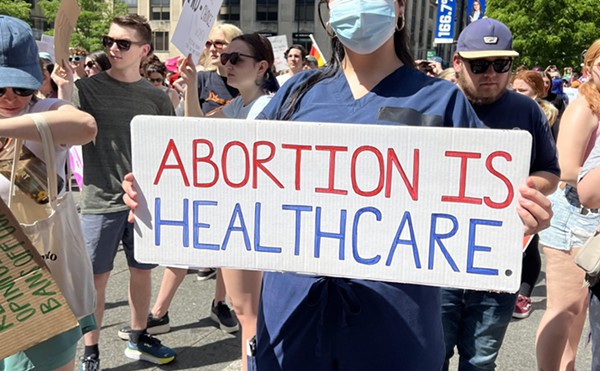Until recently, I did a nightly talk radio show on WDBZ (1230 AM), with a largely African-American audience.
On my last day, the story broke that Lt. Col. Ron Twitty was being removed from his police duties with pay for allegedly lying on an investigation report about damage done to his police-issued car July 4.
That night I experienced something I hadn't during the full year of my broadcasts: Every African-American caller expressed essentially the same opinion on a topic. I mean flat-out everyone.
The view? That Ron Twitty got screwed. That calling a news conference on a slow Friday afternoon guaranteed nuclear-grade embarrassment for a decorated 29-year veteran and a scorching emotional meltdown in the black community. All this on behalf of a man who is presumed, of course, to be innocent until proven guilty.
As I heard this symphony of protests, interrupted only by commercial stop sets, I kept thinking that the powers who wander City Hall could not have planned this. That they surely would have crafted another strategy for rolling out this information if they had known that it would be so universally rejected in the African-American community.
That if they were so bent on vaporizing the pesky downtown boycott, they would have thought through this a bit more. That Police Chief Tom Streicher, City Manager Valerie Lemmie and Mayor Charlie Luken surely would have pooled their instincts, training and experiences to a better end with so much on the line in a city so known for its racial conflict.
I mean, these same people had desperately hoped the high profile signing of the collaborative agreement and the ground breaking for the Underground Railroad Freedom Center and the Billy Graham mission would heal our racial divide and drive those protesters out of Dodge. Then along comes this mess.
Now, my talk show callers were not saying Twitty was above the law, above investigation. If there were concrete evidence requiring a look into his actions, go for it, they seemed to say.
What nearly melted down my lines was passion against the process. Why was the highest-ranking African-American officer taken out under the planned glare of TV lights? Why was he stripped of his badge and gun instead of put into another duty? Why was the whole matter turned over to the county sheriff, a man not seen by all as objective? Why was Twitty treated differently from other officers who have recently come under suspicion? Process. That was their drumbeat.
By the time this piece runs, Twitty could be exonerated. From the evidence presented in news publications, there seems no way Twitty could ever be charged with anything.
From the beginning, my personal conclusion was Twitty was innocent. No, he wasn't drunk. He didn't lie. He didn't hatch a plan to cover anything. He's just Ron Twitty. The guy Streicher could count on to have his back even when it occasionally earned Twitty the "Uncle Tom" snarl. The same Twitty they could send into Over-the-Rhine to try to calm folks down. The same Twitty who works tirelessly for good causes all over Cincinnati. The same Twitty who shows love for everyone.
But it was the process the city employed that needs to be attacked, so that it never happens again.
Don't judge the bungled method merely by phones ringing off the hook at a radio station. Judge it also by dollar signs — huge ones. With one poorly orchestrated news conference, city officials drove a huge national organization into the boycott ranks, a boycott they counted on fading like the mist of a ghost.
The Urban League's pullout in the shadow of the Twitty suspension could go down as the most significant moment in that clever social protest strategy.
Sure, Chief Streicher defends his Twitty process. He says when he handed up former Cincinnati Police Officer Steven Roach's head in a department report to a full city council chamber, he pledged a new day of police honesty in Cincinnati. He says he couldn't see putting an assistant chief at the auto impound lot, as he does beat cops who are under investigation. He says media outlets were about to break the story that very evening. He says he didn't want the accusation that he was blocking for Twitty, an old friend, so he had to turn the investigation over to Hamilton County Sheriff Simon Leis.
Yeah, yeah, yeah. So you chose a process to further divide a community that has more similarities to Northern Ireland than we care to admit.
The fact is you misjudged. You screwed up. Then some of you went off on trips. The fact is if you had it to do again, you would not have done it this way and you know it. The fact is you're paid high salaries not to misjudge, not to divide the very community you lead.
No damn doubt about it. We have a long way to go in Cincinnati, and one wonders if we have the people in place to get us there. The boycott is not over by a long shot — and shouldn't be, until a reasonable amount of progress is made toward justice in Cincinnati.
The protesting is not over. The battle of lawsuits is not over. The national stories about a divided Cincinnati are not over. The angry radio talk-show calls are not over. Sadly our leaders' poor judgement calls are also probably not over.
We can only hope that when Twitty is cleared, his career is not damaged. If he's lucky, he'll get a sympathy bump from the white community as well as the black. In fact, in spite of this public relations and procedural nightmare, I still expect him one day to become Cincinnati's first African-American police chief.
But hey, I'm that guy who agreed that Friday night with every one of his callers.
PUTTIN' OUT THE BONE appears monthly.





